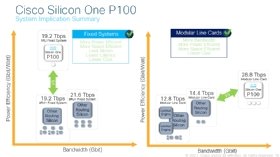
Getty Images
Cisco's newest Silicon One chip steps up routing performance
The P100 ASIC delivers a high performance-to-power ratio for web-scale data centers. It's the 11th chip in the Silicon One family.
Cisco has released the P100 processor, a 19.2 Tbps chip optimized for high-density, high-performance routing in web-scale data centers.
Launched this week, the P100 is the 11th product in the Silicon One family, which the company introduced in 2019 for communication and cloud service providers. The application-specific integrated circuits (ASIC) were the first that Cisco sold for white-box switches. Many service providers prefer the open hardware over proprietary products from Cisco and other vendors.
Within a line card, the P100 provides maximum benefit when used in triplicate within a 36-port device, Cisco said. The configuration carries more bandwidth and a high performance-to-power ratio within a relatively small amount of space.
Higher bandwidth reduces the network complexity that comes with working around bandwidth constraints. As a result, customers' total operating costs will fall with the P100, according to Cisco.
In a fixed system, one P100 can run a router with 24 800 Gbps interfaces.
At the center of the P100 development team's thinking was the performance to power ratio. Rakesh Chopra, head of Cisco Silicon One architecture, said the "fundamental limitation that exists in the industry" is electrical power to drive data centers. Therefore, a chip's power efficiency is a crucial selling point.
Will Townsend, an analyst at Moor Insights & Strategy, said the P100 builds on a product line with a demonstrated track record in silicon performance. "Silicon One overall positions Cisco very well for routing and web-scale switching," he said.

Cisco launched the P100 this week. The company did not release pricing.
Cloud service providers like AWS, Microsoft Azure and Google Cloud are typical customers for Silicon One and competing products from Broadcom. In general, the cloud providers favor using the chips in hardware designs standardized by the Open Compute Project founded by Facebook in 2011.
Meanwhile, Cisco announced this week that it intends to acquire the German enterprise software company Replex GmbH. Cisco plans to fold technology from the privately held company into the AppDynamics application performance monitor.
Cisco's AppDynamics provides visibility into the performance of application infrastructure, service tiers and business transactions. Replex would add expertise in the Kubernetes container platform and real-time data extraction and analytics.







